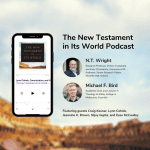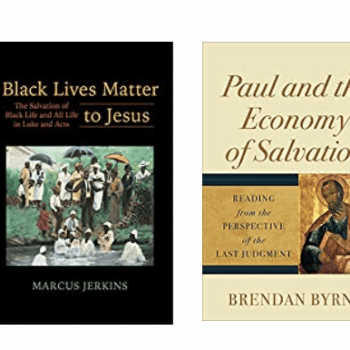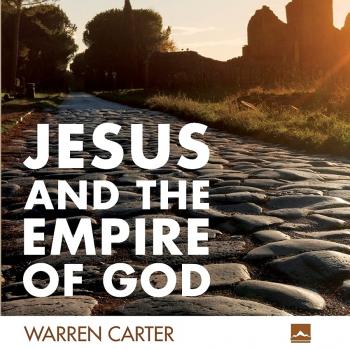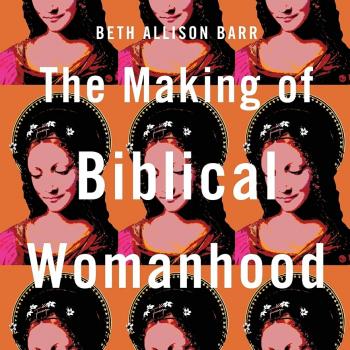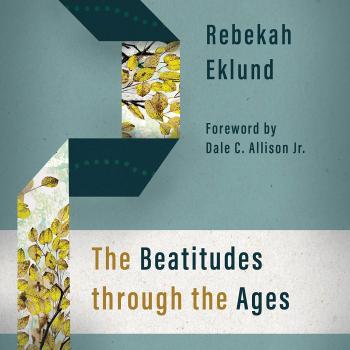Here are my top picks for new books releasing in August and September. Enjoy!
August 2020
Amy-Jill Levine, Sermon on the Mount: A Beginner’s Guide to the Kingdom of Heaven (Abingdon Press)
The Sermon on the Mount, Matthew 5-7, contains some of Jesus most profound and most memorable teachings. What might these teachings have mean to his disciples, and to the others who first heard them? How do they enhance our reading of the rest of the Gospel of Matthew, and how do they speak across the centuries to listeners today? How, if we pay careful attention to his words, does Jesus provide us a road map to living as God would have us live?
In Sermon on the Mount: A Beginner’s Guide to the Kingdom of Heaven, Dr. Amy-Jill Levine introduces the major topics in the Sermon on the Mount, explains historical and theological contexts, and shows how the words of Jesus echo his Jewish tradition and speak forward to reach hearts and minds today.
This book provides a rich and challenging learning experience for the individual reader and also makes a wonderful, six-week group study with the additional Leader Guide, DVD, and 40-day readings

 Eve-Marie Becker, Paul on Humility (Baylor University Press)
Eve-Marie Becker, Paul on Humility (Baylor University Press)
description:
Humility in the modern world is neither well understood nor well received. Many see it as a sign of weakness; others decry it as a Western construct whose imposition onto marginalized persons only perpetuates oppression. This skepticism has a long pedigree: Aristotle, for instance, pointed to humility as a shameless front. What then are we to make of the New Testament’s valorization of this trait?
Translated from German into English for the first time, Paul on Humility seeks to reclaim the original sense of humility as an ethical frame of mind that shapes community, securing its centrality in the Christian faith. This exploration of humility begins with a consideration of how the concept plays into current cultural crises before considering its linguistic and philosophical history in Western culture. In turning to the roots of Christian humility, Eve-Marie Becker focuses on Philippians 2, a passage in which Paul appeals to the lowliness of Christ to encourage his fellow Christians to persevere. Becker shows that humility both formed the basis of the ethic Paul instilled in churches and acted as a mimetic device centered on Jesus’ example that was molded into the earliest Christian identity and community.
Becker resists the urge to cheapen humility with mere moralism. In the vision of Paul, the humble individual is one immersed in a complex, transformative way of being. The path of humility does not constrain the self; rather, it guides the self to true freedom in fellowship with others. Humility is thus a potent concept that speaks to our contemporary anxieties and discomforts.
Sean A. Adams, Greek Genres and Jewish Authors: Negotiating Literary Culture in the Greco-Roman Era (Baylor University Press)
The ancient world, much like our own, thrived on cultural diversity and exchange. The riches of this social reality are evident in the writings of Jews in the Hellenistic and Roman eras. Jewish authors drew on the wide range of Greek literary conventions and gave fresh expressions to the proud traditions of their faith and ethnic identity. They did not hesitate to modify and adapt the forms they received from the surrounding culture, but their works stand as legitimate participants in Greco-Roman literary tradition.
In Greek Genres and Jewish Authors, Sean Adams argues that a robust understanding of ancient genre facilitates proper textual interpretation. This perspective is vital for insight on the author, the work’s original purpose, and how the original readers would have received it. Adopting a cognitive-prototype theory of genre, Adams provides a detailed discussion of Jewish authors writing in Greek from ca. 300 BCE to ca. 135 CE―including New Testament authors―and their participation in Greek genres. The nine chapters focus on broad genre divisions (e.g., poetry, didactic, philosophy) to provide studies on each author’s engagement with Greek genres, identifying both representative and atypical expressions and features.
The book’s most prominent contribution lies in its data synthesis to provide a macroperspective on the ways in which Jewish authors participated in and adapted Greek genres―in other words, how members of a minority culture intentionally engaged with the dominant culture’s literary practices alongside traditional Jewish features, resulting in unique text expressions. Greek Genres and Jewish Authors provides a rich resource for Jewish, New Testament, and classical scholars, particularly those who study cultural engagement, development of genres, and ancient education.
Ben Witherington and Jason Myers, Voices and Views on Paul: Exploring Scholarly Trends (IVP Academic)
This is basically The Paul Quest for a new era of scholarship. A quick read with great insight into the hot debates of the field.
Here is my endorsement:
“The academic study of the apostle is a world unto itself―a world in which it would be very easy to get lost without guidance. Witherington and Myers know the terrain well and offer much insight into the major trends, debates, and crosscurrents of the last two decades. Whether you are a new explorer to Pauline studies or a seasoned traveler, Voices and Views on Paul has much to offer in the big picture as well as the finer details.” (Nijay K. Gupta, professor of New Testament at Northern Seminary)
September 2020

 Dennis R. Edwards, Might from the Margins: The Gospel’s Power to Turn the Tables on Injustice (Herald Press)
Dennis R. Edwards, Might from the Margins: The Gospel’s Power to Turn the Tables on Injustice (Herald Press)
God has empowered marginalized Christians to transform the church.
Here is my endorsement for this great book:
“The apostle Paul tells the Corinthians that God chose the marginalized, the “nobodies,” to rob the elite and popular, the “somebodies,” of their status (1 Cor 1:28). That is what MIGHT FROM THE MARGINS is all about. Edwards highlights how the gospel is God’s power to lift up every valley and make low every mountain. Some readers will find this book troubling and upsetting, others will be filled with hope and courage. What a bold, beautiful, and incisive message for a Church that God wants to transform! ” (Nijay K. Gupta)

 Willie James Jennings, After Whiteness: An Education in Belonging
Willie James Jennings, After Whiteness: An Education in Belonging
I got interested in Jennings after an OnScript podcast interview. This book looks great—timely and fresh.
Description:
On forming people who form communion
Theological education has always been about formation: first of people, then of communities, then of the world. If we continue to promote whiteness and its related ideas of masculinity and individualism in our educational work, it will remain diseased and thwart our efforts to heal the church and the world. But if theological education aims to form people who can gather others together through border-crossing pluralism and God-drenched communion, we can begin to cultivate the radical belonging that is at the heart of God’s transformative work.
In this inaugural volume of the Theological Education between the Times series, Willie James Jennings shares the insights gained from his extensive experience in theological education, most notably as the dean of a major university’s divinity school—where he remains one of the only African Americans to have ever served in that role. He reflects on the distortions hidden in plain sight within the world of education but holds onto abundant hope for what theological education can be and how it can position itself at the front of a massive cultural shift away from white, Western cultural hegemony. This must happen through the formation of what Jennings calls erotic souls within ourselves—erotic in the sense that denotes the power and energy of authentic connection with God and our fellow human beings.
After Whiteness is for anyone who has ever questioned why theological education still matters. It is a call for Christian intellectuals to exchange isolation for intimacy and embrace their place in the crowd—just like the crowd that followed Jesus and experienced his miracles. It is part memoir, part decolonial analysis, and part poetry—a multimodal discourse that deliberately transgresses boundaries, as Jennings hopes theological education will do, too.
Dana Harris, An Introduction to Biblical Greek (Zondervan Academic)
Another Greek book, you ask? This one is really good. Harris is a clear and engaging writer and offers the latest linguistic-oriented approach to Greek studies.
Here is my endorsement:
A great Greek textbook is up-to-date on Greek studies and linguistics, but functions as a simple and clear guide for (often intimidated) beginning students. It ought to be visually appealing with assignments that are challenging but not overwhelming. It should include plenty of examples and illustrations without a back-breaking page count. Impressively, Harris’ introduction accomplishes all of these things. Students can be relieved that this textbook will introduce Greek plainly; instructors can rest assured that the material is reliable and represents the state of biblical Greek scholarship.” (Nijay K. Gupta)
Francis Moloney, Apocalypse of John: A Commentary (Baker Academic)
Moloney is a great commentary writer and knows the Johannine literature well. You might be wondering, will Moloney offer anything “new”? Absolutely: from the description: “Challenging the assumed consensus among New Testament scholars, Moloney reads Revelation not as an exhortation to faithfulness in a period of persecution but as a celebration of the ongoing effects of Jesus’s death and resurrection. “
Douglas Harink, Resurrecting Justice: Reading Romans for the Life of the World (IVP)
A fresh look at the theme of justice in Romans. Here is my endorsement:
“What is Romans about? We know the traditional answers: justification by faith, forgiveness of sins, personal salvation. Harink doesn’t throw these out the window but puts the spotlight on the thematic thread of justice that runs all through Romans. I admit that I had my initial hesitations and doubts about reading Romans as a treatise on justice, but by the end I was a believer! Harink joins together what has often been torn asunder today―the relationships between personal and corporate, individual and communal, and personal justification and social justice in Christian thought and theology―with the resurrection of Christ at the center of it all.” (Nijay K. Gupta, professor of New Testament at Northern Seminary)
Esau McCaulley, Reading While Black: African American Biblical Interpretation as an Exercise in Hope (IVP Academic)
This is an important book, written by a powerful voice, coming at a pivotal time in American history. Read this.
My endorsement:
“When I was a student, I was explicitly and implicitly trained to focus exclusively on the ancient context of Scripture and read ‘objectively.’ Bible study could easily become a disembodied experience. McCaulley makes a compelling case, in this engagement with African American biblical interpretation, that not only is the reader’s culture and experience not a hindrance to interpretation per se but can enrich it greatly. Reading While Black is a unique and successful blend of biblical hermeneutics, autobiography, black history and spirituality, incisive cultural commentary on race matters in America, and insightful exegesis of select New Testament texts.” (Nijay K. Gupta, professor of New Testament at Northern Seminary)












